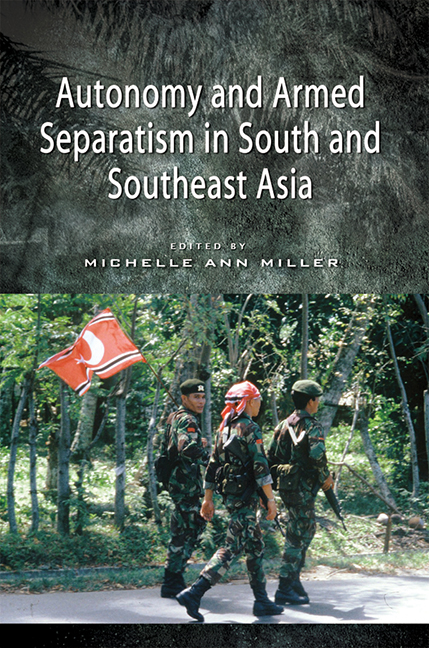Book contents
- Frontmatter
- Dedication
- Contents
- Acknowledgements
- About the Contributors
- 1 The Problem of Armed Separatism: Is Autonomy the Answer?
- 2 Mediated Constitutionality as a Solution to Separatism
- 3 Self-Governance as a Framework for Conflict Resolution in Aceh
- 4 Autonomy and Armed Separatism in Papua: Why the Cendrawasih Continues to Fear the Garuda
- 5 The Parallels and the Paradox of Timor-Leste and Western Sahara
- 6 Between Violence and Negotiation: Rethinking the Indonesian Occupation and the East Timorese Resistance
- 7 Struggle over Space in Myanmar: Expanding State Territoriality after the Kachin Ceasefire
- 8 Sri Lanka's Ethnic Conflict: The Autonomy-Separation Dialectic
- 9 Unitarianism, Separatism and Federalism: Competing Goals and Problems of Compromise in Sri Lanka
- 10 Autonomy and Armed Separatism in Jammu and Kashmir
- 11 Armed Conflicts and Movements for Autonomy in India's Northeast
- 12 Southern Thailand: The Trouble with Autonomy
- 13 The Last Holdout of an Integrated State: A Century of Resistance to State Penetration in Southern Thailand
- 14 Interlocking Autonomy: Manila and Muslim Mindanao
- 15 History, Demography and Factionalism: Obstacles to Conflict Resolution through Autonomy in the Southern Philippines
- 16 Conclusion
- Index
5 - The Parallels and the Paradox of Timor-Leste and Western Sahara
Published online by Cambridge University Press: 21 October 2015
- Frontmatter
- Dedication
- Contents
- Acknowledgements
- About the Contributors
- 1 The Problem of Armed Separatism: Is Autonomy the Answer?
- 2 Mediated Constitutionality as a Solution to Separatism
- 3 Self-Governance as a Framework for Conflict Resolution in Aceh
- 4 Autonomy and Armed Separatism in Papua: Why the Cendrawasih Continues to Fear the Garuda
- 5 The Parallels and the Paradox of Timor-Leste and Western Sahara
- 6 Between Violence and Negotiation: Rethinking the Indonesian Occupation and the East Timorese Resistance
- 7 Struggle over Space in Myanmar: Expanding State Territoriality after the Kachin Ceasefire
- 8 Sri Lanka's Ethnic Conflict: The Autonomy-Separation Dialectic
- 9 Unitarianism, Separatism and Federalism: Competing Goals and Problems of Compromise in Sri Lanka
- 10 Autonomy and Armed Separatism in Jammu and Kashmir
- 11 Armed Conflicts and Movements for Autonomy in India's Northeast
- 12 Southern Thailand: The Trouble with Autonomy
- 13 The Last Holdout of an Integrated State: A Century of Resistance to State Penetration in Southern Thailand
- 14 Interlocking Autonomy: Manila and Muslim Mindanao
- 15 History, Demography and Factionalism: Obstacles to Conflict Resolution through Autonomy in the Southern Philippines
- 16 Conclusion
- Index
Summary
This chapter is, via a comparison of the problems of Timor-Leste and Western Sahara, aimed at revealing the relevant experiences of the two cases that can be contextualized into efforts to understand contemporary problems of armed separatist movements. Resorting to this comparison rather than depending on similar comparisons from the region is interesting from an international legal perspective. The chapter aims to explore what factors lay behind the rejection of autonomy by the Timorese people in the 1999 referendum. It also examines the argument of many observers who suggested that, one of the underlying factors in the opposition of the Timorese toward the offer of autonomy by the United Nations was the strength of Timor's case in international law. Western Sahara is, however, a counter example to the latter argument since, despite having a strong case in terms of international law, a just and acceptable solution has eluded it. The chapter concludes by arguing that autonomy is not always a magic bullet. International legal elements can be effective should there be a move towards more open and democratic occupying force, as was the case of Indonesia in relation to Timor-Leste case.
BACKGROUND: THE CASE OF TIMOR-LESTE
Timor-Leste was a Portuguese colony for almost 450 years. Sporadic revolts by the Timorese people, such as the Manufahi revolt of 1910–1912 under the leadership of the King of Manufahi, Dom Boa Ventura, were finally crushed by Portugal. The struggle for independence took shape in the 1970s, after the flower revolution in Portugal in 1974 paved the way for the people of Timor-Leste to form political parties as the beginning of the decolonization process. However, Portugal failed to shepherd the process of decolonization. Following this, the Indonesian regime under Soeharto invaded Timor-Leste on 7 December 1975, a day before the visit by the United States’ State Secretary Henry Kissinger and President Gerald Ford to Jakarta. During the Indonesian occupation, massive human rights abuses were committed by the Indonesian military regime resulting in the death of more than two hundred thousand Timorese. The Revolutionary Front for the Liberation of Timor-Leste (Frente Revolucionária do Timor-Leste Independente or Fretilin) — the de facto government- fought against the illegal occupation.
- Type
- Chapter
- Information
- Publisher: ISEAS–Yusof Ishak InstitutePrint publication year: 2012



